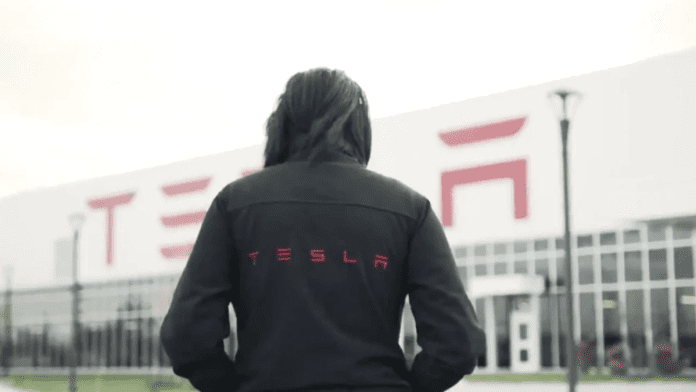🕒 Last updated on September 13, 2025
Tesla, the electric vehicle giant led by Elon Musk, is facing a major lawsuit in San Francisco federal court. The lawsuit claims the company favors H-1B visa holders over American workers when making hiring and firing decisions.
Tesla Faces Serious Legal Allegations
According to the complaint, Tesla may have broken federal civil rights laws by giving visa-dependent employees priority over U.S. citizens.
The case was filed as a class-action lawsuit, which means it could include a large number of current and former applicants or employees. The complaint says Tesla systematically prioritizes workers who require visas to reduce labor costs. The result, according to the filing, is that qualified American applicants are often overlooked or excluded from jobs they are fully capable of performing.
U.S. applicants say they were either not hired or pushed aside because they did not need visa sponsorship. The complaint further alleges that American employees in similar positions were paid more than H-1B visa holders doing the same work. This practice is often referred to in the industry as “wage theft,” as it allows companies to save money by paying visa workers less.
The lawsuit highlights growing concerns over employment practices at major tech companies and raises questions about fairness for U.S. workers in high-skilled roles.
Changan’s 930-mile EV shocks industry – is Tesla losing the clean tech race?
Alleged Bias Against American Workers
The complaint points out that Tesla’s hiring and promotion practices may disproportionately harm U.S. citizens. Several applicants reportedly faced direct rejection because they were not on H-1B visas. Some were told roles were “H-1B only,” while others were denied interviews despite previous experience with Tesla.
The lawsuit emphasizes that while H-1B visa holders make up only a small percentage of the U.S. workforce, Tesla appears to favor these workers heavily. This preference allows the company to hire skilled employees at lower wages than would be required for American citizens.
Tesla’s reliance on H-1B visa workers has been significant in recent years. In 2024, for example, the company reportedly hired over 1,300 H-1B employees. Meanwhile, more than 6,000 U.S. workers, most of them citizens, were laid off. These numbers suggest a deliberate strategy to balance the company’s staffing needs with lower wage expenses through visa programs.
Elon Musk faces lawsuit over claims of illegal $1 million election lottery
The lawsuit also refers to public statements made by Elon Musk acknowledging the importance of H-1B visas. In a social media post dated December 27, 2024, Musk called the visa program “critical” for him personally and for key contributors at Tesla and SpaceX. Critics argue this acknowledgment shows a reliance on the visa system, possibly at the expense of American workers seeking similar roles.
Experts say the case could shine a light on how large tech companies navigate visa programs. For American applicants, the alleged preference for H-1B employees may have real consequences, including missed job opportunities and unequal pay.
What the Lawsuit Seeks
The lawsuit seeks compensation for U.S. citizens who applied for Tesla positions in the United States but were not hired or who were employed and later terminated. If the court approves class-action status, the case could affect a significant number of individuals who applied or worked at Tesla over the years.
The complaint stresses that Tesla’s alleged favoritism toward visa holders has concrete consequences. U.S. workers may have lost jobs, suffered wage disparities, and faced professional setbacks simply because they were not dependent on visa sponsorship.
Trump slams Bolsonaro’s 27-year prison term as U.S. weighs punishing Brazil
While the lawsuit focuses on hiring practices, it also touches on broader issues of fairness in employment. If the allegations are proven, they could serve as a warning for other companies that rely heavily on visa programs to fill high-skilled roles.
Tesla has not made a public statement regarding the lawsuit at this time. The case is ongoing in federal court, and legal observers are closely watching developments.
The lawsuit raises serious questions about equal treatment and the rights of American workers in the tech industry. It could have significant implications for hiring practices at companies that heavily use H-1B visas, potentially influencing policy discussions and future employment strategies.

